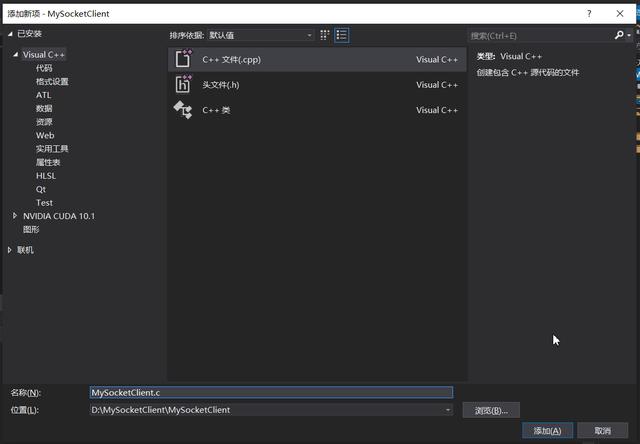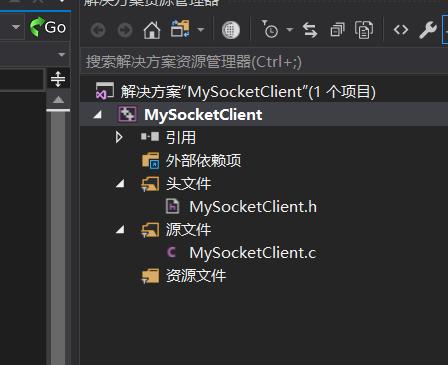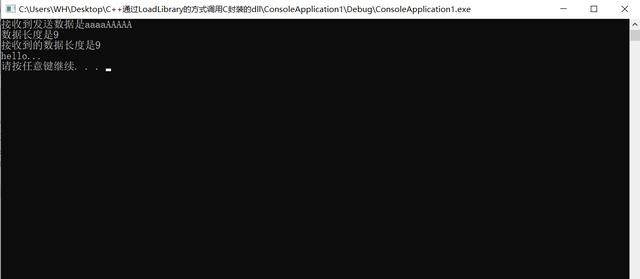编写DLL代码
新建工程
新建空项目工程

点击确定。然后右键项目选择新建项。

出现下图,选择头文件。

再次选择新建项,选中C++文件,将其改为MySocketClient.c,然后选择添加。

到这里,新建工程就完成了。

然后右键项目,选择属性 将配置类型改为动态库(.dll)

编写头文件MySocketClient.h
#ifndef _INC_MYSOCKETCLIENT_H_
#define _INC_MYSOCKETCLIENT_H_
#define Import_SSS
#ifdef Import_SSS
#define API _declspec(dllexport)
#else
#define API _declspec(dllimport)
#endif
#ifdef _cplusplus//extern”C” 来告诉编译器:这是一个用C写成的库文件,请用C的方式来链接它们。
extern “C” {
#endif // _cplusplus
API//导出函数,让外界调用。
int socketClient_Init(void **handle);
API
int socketClient_Send(void *handle, unsigned char *buf, int buflen);
API
int socketClient_Recv(void *handle, unsigned char *buf, int *buflen);
API
int socketClient_Destory(void *handle);
#ifdef _cplusplus
}
#endif // _cplusplus
#endif //_INC_MYSOCKETCLIENT_H_
编写MySocketClient.c
#define _CRT_SECURE_NO_WARNINGS
#include <stdlib.h>
#include <string.h>
#include <stdio.h>
#include “MySocketClient.h”
typedef struct _Sck_Handle
{
char version[16];
char ip[16];
int port;
unsigned char *p;
int len;
}Sck_Handle;//定义Handle的结构体。
int socketClient_Init(void **handle)
{
int ret = 0;
Sck_Handle *tmpHandle = NULL;
if (handle == NULL)
{
ret = -1;
printf(“[socketClient_Init] err %d handle=NULL n”, ret);
return ret;
}
tmpHandle = (Sck_Handle *)malloc(sizeof(Sck_Handle));
if (tmpHandle == NULL)
{
ret = -2;
printf(“[socketClient_Init] err:%d malloc err n”, ret);
}
memset(tmpHandle, 0, sizeof(Sck_Handle));//初始化结构体。
strcpy(tmpHandle->version, “1.0.0.1”);
strcpy(tmpHandle->ip, “192.168.12.121”);
tmpHandle->port = 11111;
*handle = tmpHandle;
return ret;
}
////socket报文发送
//__declspec(dllexport)
int socketClient_Send(void *handle, unsigned char *buf, int buflen)
{
int ret = 0;
Sck_Handle *tmpHandle = NULL;
if (handle == NULL || buf == NULL || buflen <= 0)
{
ret = -2;
printf(“func socketclient_send() err :%d (handle == NULL || buf==NULL || buflen <=0 ) n”, ret);
return ret;
}
tmpHandle = (Sck_Handle *)handle;
tmpHandle->len = buflen;
tmpHandle->p = (unsigned char *)malloc(buflen);
if (tmpHandle->p == NULL)
{
ret = -2;
printf(“func socketclient_send() err :%d malloc len:%d n”, ret, buflen);
return ret;
}
memcpy(tmpHandle->p, buf, buflen); //数据的缓存到内存
printf(“接收到发送数据是%s n”, tmpHandle->p);
return ret;
}
////socket报文接受
//__declspec(dllexport)
int socketClient_Recv(void *handle, unsigned char *buf, int *buflen)
{
int ret = 0;
Sck_Handle *tmpHandle = NULL;
if (handle == NULL || buf == NULL || buflen == NULL)
{
ret = -2;
printf(“func socketclient_recv() err :%d (handle == NULL || buf==NULL || buflen==NULL ) n”, ret);
return ret;
}
tmpHandle = (Sck_Handle *)handle;
memcpy(buf, tmpHandle->p, tmpHandle->len);
*buflen = tmpHandle->len; //间接赋值 告诉调用者 收到的数据的长度
printf(“数据长度是%d n”, tmpHandle->len);
return ret;
}
////socket环境释放
//__declspec(dllexport)
int socketClient_Destory(void *handle)
{
int ret = 0;
Sck_Handle *tmpHandle = NULL;
if (handle == NULL)
{
return -1;
}
tmpHandle = (Sck_Handle *)handle;
if (tmpHandle->p != NULL)
{
free(tmpHandle->p); //释放结构体 成员域的 指针所指向的内存空间
}
free(tmpHandle); //释放结构体内存
return 0;
}
然后右键编译工程。在Debug文件夹下面就可以看到生成的dll
动态调用
动态调用,使用LoadLibrary方法加载dll。
新建C++控制台应用程序

新建完成后,将编译好的dll文件、lib文件和h文件放到工程下面。

右键项目属性,将字符集改为使用多字节字符集。

下面是调用dll的代码。
#define _CRT_SECURE_NO_WARNINGS
#include <stdio.h>
#include <windows.h>
#include <iostream>
using namespace std;
//定义指针函数
typedef int(*SOCLETCLIENT_INIT)(void **handle);
typedef int(*SOCKETCLIENT_SEND)(void *handle, unsigned char *buf, int buflen);
typedef int(*SOCKETCLIENT_RECV)(void *handle, unsigned char *buf, int *buflen);
typedef int(*SOCKETCLIENT_DESTORY)(void *handle);
int main()
{
HINSTANCE hInstance;
hInstance = LoadLibrary(“MySocketClient.dll”);
SOCLETCLIENT_INIT socketClient_Init= (SOCLETCLIENT_INIT)GetProcAddress(hInstance, “socketClient_Init”);
SOCKETCLIENT_SEND socketClient_Send=(SOCKETCLIENT_SEND)GetProcAddress(hInstance, “socketClient_Send”);;
SOCKETCLIENT_RECV socketClient_Recv= (SOCKETCLIENT_RECV)GetProcAddress(hInstance, “socketClient_Recv”);;
SOCKETCLIENT_DESTORY socketClient_Destory= (SOCKETCLIENT_DESTORY)GetProcAddress(hInstance, “socketClient_Destory”);;
unsigned char buf[1024];
int buflen;
unsigned char out[1024];
int outlen;
void *handle = NULL;
int ret = 0;
strcpy((char *)buf, “aaaaAAAAAFFffffffdddddddd”);
buflen = 9;
//客户端初始化 获取handle上下
ret = socketClient_Init(&handle /*out*/);
if (ret != 0)
{
printf(“func socketclient_init() err:%d n “, ret);
goto End;
}
//客户端发报文
ret = socketClient_Send(handle /*in*/, buf /*in*/, buflen /*in*/);
if (ret != 0)
{
printf(“func socketclient_send() err:%d n “, ret);
goto End;
}
//客户端收报文
ret = socketClient_Recv(handle /*in*/, out /*in*/, &outlen/*in out*/);
if (ret != 0)
{
printf(“func socketclient_recv() err:%d n “, ret);
goto End;
}
printf(“接收到的数据长度是%d n”,outlen);
End:
//客户端释放资源
ret = socketClient_Destory(handle/*in*/);
if (hInstance != NULL)
{
FreeLibrary(hInstance);
hInstance = NULL;
}
printf(“hello…n”);
system(“pause”);
return 0;
}
使用
#define _CRT_SECURE_NO_WARNINGS
#include <stdio.h>
#include <windows.h>
#include <iostream>
using namespace std;
#pragma comment(lib,”MySocketClient.lib”)
extern “C”
{
int socketClient_Init(void **handle);
int socketClient_Send(void *handle, unsigned char *buf, int buflen);
int socketClient_Recv(void *handle, unsigned char *buf, int *buflen);
int socketClient_Destory(void *handle);
}
int main()
{
unsigned char buf[1024];
int buflen;
unsigned char out[1024];
int outlen;
void *handle = NULL;
int ret = 0;
strcpy((char *)buf, “aaaaAAAAAFFffffffdddddddd”);
buflen = 9;
//客户端初始化 获取handle上下
ret = socketClient_Init(&handle /*out*/);
if (ret != 0)
{
printf(“func socketclient_init() err:%d n “, ret);
goto End;
}
//客户端发报文
ret = socketClient_Send(handle /*in*/, buf /*in*/, buflen /*in*/);
if (ret != 0)
{
printf(“func socketclient_send() err:%d n “, ret);
goto End;
}
//客户端收报文
ret = socketClient_Recv(handle /*in*/, out /*in*/, &outlen/*in out*/);
if (ret != 0)
{
printf(“func socketclient_recv() err:%d n “, ret);
goto End;
}
printf(“接收到的数据长度是%d n”, outlen);
End:
//客户端释放资源
ret = socketClient_Destory(handle/*in*/);
printf(“hello…n”);
system(“pause”);
return 0;
}
静态调用
静态调用,使用lib文件调用
#define _CRT_SECURE_NO_WARNINGS
#include <stdio.h>
#include <windows.h>
#include <iostream>
using namespace std;
#pragma comment(lib,”MySocketClient.lib”)
extern “C”
{
int socketClient_Init(void **handle);
int socketClient_Send(void *handle, unsigned char *buf, int buflen);
int socketClient_Recv(void *handle, unsigned char *buf, int *buflen);
int socketClient_Destory(void *handle);
}
int main()
{
unsigned char buf[1024];
int buflen;
unsigned char out[1024];
int outlen;
void *handle = NULL;
int ret = 0;
strcpy((char *)buf, “aaaaAAAAAFFffffffdddddddd”);
buflen = 9;
//客户端初始化 获取handle上下
ret = socketClient_Init(&handle /*out*/);
if (ret != 0)
{
printf(“func socketclient_init() err:%d n “, ret);
goto End;
}
//客户端发报文
ret = socketClient_Send(handle /*in*/, buf /*in*/, buflen /*in*/);
if (ret != 0)
{
printf(“func socketclient_send() err:%d n “, ret);
goto End;
}
//客户端收报文
ret = socketClient_Recv(handle /*in*/, out /*in*/, &outlen/*in out*/);
if (ret != 0)
{
printf(“func socketclient_recv() err:%d n “, ret);
goto End;
}
printf(“接收到的数据长度是%d n”, outlen);
End:
//客户端释放资源
ret = socketClient_Destory(handle/*in*/);
printf(“hello…n”);
system(“pause”);
return 0;
}
运行结果:



